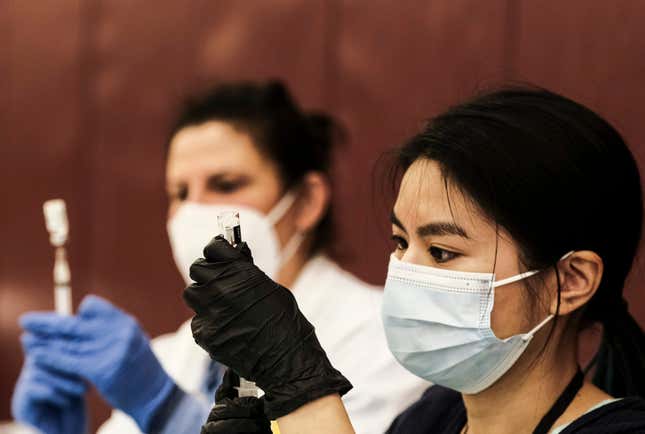
The Food and Drug Administration (FDA) and the Centers for Disease Control and Prevention (CDC) will stop using the Johnson & Johnson vaccine at federal sites and are encouraging states to do the same amid news that six people experienced a rare blood disorder within two weeks of vaccination, with one of them dying and the other person being hospitalized in critical condition.
The New York Times reports that some seven million people have been jabbed with the Johnson & Johnson shot and nine million doses have been shipped out to states. Gov. Mike DeWine of Ohio ordered health providers in his state to stop giving Johnson & Johnson shots. New York, Connecticut, Nebraska and other states did as well.
A number of drug stores, including CVS and Walgreens, have paused the Johnson & Johnson vaccines and are rescheduling appointments.
“We are recommending this pause while we work together to fully understand these events, and also so we can get information out to health care providers and vaccine recipients,” Dr. Janet Woodcock, acting FDA commissioner, said during a briefing Tuesday.
Here is more on the blood clots, per the Times:
Federal officials are concerned that doctors may not be trained to look for the rare disorder if recipients of the vaccine develop symptoms of it. The federal health agencies said Tuesday morning that “treatment of this specific type of blood clot is different from the treatment that might typically be administered” for blood clots.
“Usually, an anticoagulant drug called heparin is used to treat blood clots. In this setting, administration of heparin may be dangerous, and alternative treatments need to be given,” the statement said.
In a news release, Johnson & Johnson said: “We are aware that thromboembolic events including those with thrombocytopenia have been reported with Covid-19 vaccines. At present, no clear causal relationship has been established between these rare events and the Janssen Covid-19 vaccine.” Janssen is the name of Johnson & Johnson’s division that developed the vaccine.
In the United States alone, 300,000 to 600,000 people a year develop blood clots, according to C.D.C. data. But the particular blood clotting disorder that the vaccine recipients developed, known as cerebral venous sinus thrombosis, is extremely rare.
All of the women developed the condition within about two weeks of vaccination, and government experts are concerned that an immune system response triggered by the vaccine was the cause. Federal officials said there was broad agreement in the senior ranks of the administration about the need to pause use of the vaccine while the cases are investigated.
The Johnson & Johnson shots were not as numerous as the Pfizer-BioNTech and Moderna vaccines, but the Biden administration was depending on the hundreds of thousands of those shots per week to help vaccinate as many Americans as possible to achieve herd immunity this year; comparatively, more than 23 million people got the Pfizer-BioNTech and Moderna shots.
The appeal of the Johnson & Johnson shot was that you only needed one shot compared to two.
Still, Jeffrey D. Zients, the White House Covid-19 response coordinator, said this will not be a major setback because the Biden administration’s plans on delivering enough vaccine to inoculate all 260 million adults by the end of May are still on track.
But the Johnson & Johnson setback will cover fewer than 230 million adults. Keep in mind that many people will not take the shot, so the supply, minus the Johnson & Johnson shots, may cover every person who wants the vaccine, according to federal officials who spoke with the Times.
What is also important is that the other two vaccines are very safe and the Johnson & Johnson situation is not related to the Pfizer-BioNTech and Moderna shots. A recent study shows that those vaccines are not dangerous, so no one should be discouraged from getting their shot.
In short, go get vaccinated.

